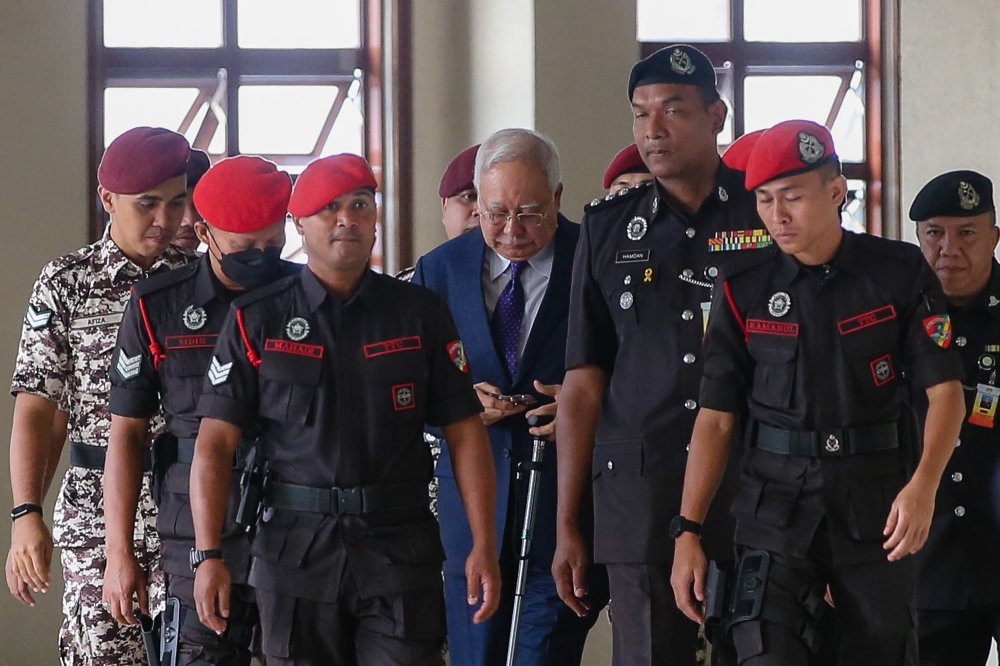DECEMBER 30 — In the case of Dato’ Sri Mohd Najib bin Tun Hj Abd Razak v Menteri Dalam Negeri & Ors [2024] MLJU 1695, the applicant filed an application for leave to commence judicial review under Order 53 of the Rules of Court 2012, principally, for the following orders:
- answer and/or confirm the existence of a supplementary order to the Main Order dated the same date (i.e. January 29, 2024) (which the applicant refers to as the ‘Addendum Order’) and which order provided that the applicant was to serve the reduced term of imprisonment under house arrest;
- to provide the applicant with a copy of the Main Order and the Addendum Order dated January 29, 2024.
The orders sought are in the nature of mandamus – that is, to compel all or any of the respondents to do the above acts.
The Attorney General (AG) appeared and opposed the application, which was heard on April 17, 2024 on the ground that the prerequisites of mandamus were not met and that the test for leave was not satisfied.
On the date of hearing of the leave application, as required by Order 53 rule 3(2), the following affidavits said to have verified the facts relied on in the Order 53 statement were before the High Court judge, Justice Amarjeet Singh Serjit Singh:
- Affidavit No. 1 affirmed by the applicant;
- Affidavit No. 2 affirmed by the applicant; and
- Affidavit No. 3 affirmed by Ahmad Zahid bin Hamidi, the President of UMNO and the Deputy Prime Minister of Malaysia.
After hearing the submissions of both parties, Justice Amarjeet Singh adjourned the application to June 5, 2024 for a decision.
In the meantime, parties were allowed to file further written submissions on whether an affidavit verifying the facts relied on in the Order 53 statement could contain hearsay material to verify the facts relied on in the Order 53 statement.
The written submissions were to be filed in the Court by the middle of May 2024.
Instead of filing the written submissions, the applicant filed two further affidavits to verify the facts relied on:
- No. 4 affirmed by Wan Rosdy bin Wan Ismail, a Vice President of UMNO and also the Menteri Besar of Pahang; and
- Affidavit No. 5 affirmed by the applicant.
Both affidavits were dated May 21 and May 25, 2024 respectively. The affidavits were followed by an application dated May 25, 2024 for the Court to accept and consider both the said affidavits for the purposes of the leave application.
The application was opposed by the AG. On June 5, 2024, Justice Amarjeet Singh allowed the application and heard submissions by the parties. The decision for the leave application had to be adjourned to July 3, 2024.
On that date, after reading the Order 53 statement and the affidavits filed on behalf of the applicant hearing orally and reading the written submissions filed by the parties, the learned High Court judge dismissed the application for leave.
In his written judgment, the learned judge said that to obtain leave under Order 53 rule 3(2) of the Rules of Court 2012, the applicant must file an affidavit verifying the facts stated in the Order 53 statement.
In the instant case, not one of the affidavits with regard to the existence of the Addendum Order was within the direct knowledge of the deponents. The evidence was pure hearsay.
The learned judge said:
“It is pertinent to observe that an application for judicial review is decided on affidavit evidence. In very rare circumstances, a deponent can be cross-examined on his affidavit verifying facts (see Order 53 Rule 6 of the Rules of Court 2012). The affidavit verifying facts is therefore an important component for obtaining leave and subsequently for the purposes of the substantive stage.
“The crucial question is whether hearsay may be referred to in an affidavit verifying the facts. I found that Affidavits No. 1, No. 2, No. 3, and No. 4 concerning the Addendum Order are hearsay.”
On whether the criteria for mandamus were satisfied, the learned judge said:
“It is trite as held by the Federal Court in Minister of Finance, Government of Sabah v Petrojasa Sdn Bhd [2008] that an order of mandamus as a relief is governed by Section 44 of the Specific Relief Act 1950 (SRA) or Paragraph 1 of the Schedule to the Courts of Judicature Act 1964 (CJA). The instant application is made under Order 53 .... If made under Order 53, the relief of mandamus is subject to the provisions of section 44 of the SRA, which is the substantive law.”

The prerequisites essential to the issue of an order under Section 44 or of a mandamus are as follows:
- the applicant must have a clear and specific legal right to the relief sought;
- there must be a duty imposed by law on the public officer(s);
- such duty must be of an imperative ministerial character involving no judgment or discretion on the part of the public officer(s); and
- the applicant must not have any remedy, other than by way of mandamus, for the enforcement of the right which has been denied to him.
The learned judge found that “there is no provision in any written law or the Federal Constitution that imposes a legal duty on the part of the Pardons Board to confirm the existence or produce any order wherein the power of pardon is exercised.
It was agreed by all parties at the outset that there is no written law concerning the Pardons Board. Mandamus can be granted only when a legal duty is imposed on an authority.”
Since the applicant failed to show “any failure on the part of the respondents, in particular, the Pardons Board, to perform any statutory duties compelled to them in law” the learned judge ruled that the applicant had failed to establish the necessary requirement under Section 44(1) of the SRA.
“The criteria for an order of mandamus is (sic) therefore not met”, concluded the learned judge.
Prior to the conclusion, Justice Amarjeet Singh had also addressed the applicant’s submission that the respondents did not reply to his solicitors’ letters to confirm or otherwise the existence of the Addendum Order. The failure to reply, according to the applicant, drew adverse inference under Section 114 Illustration (h) of the Evidence Act 1950.
The learned judge had the following to say:
“It suffices to state that [the provision] does not apply to affidavits by virtue of Section 2 of the Evidence Act 1950.
“More importantly, while it is good governance and transparency for public officers to respond to queries ... the law does not impose a duty on the respondents to do so.”
Did the learned judge err on the law?
The Court of Appeal will decide after hearing the appeal of the applicant on January 6, 2025.
Let’s just wait for the Court of Appeal decision.
* This is the personal opinion of the writer and does not necessarily represent the views of Malay Mail.





















